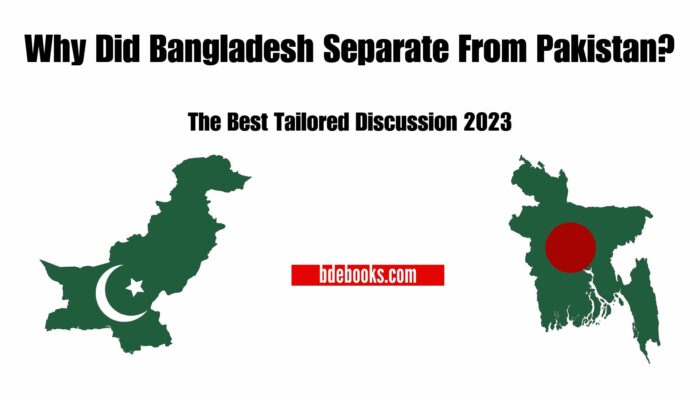
Why Did Bangladesh Separate From Pakistan: The Best Tailored Discussion 2023
Why Did Bangladesh Separate From Pakistan is a significant event in the history of South Asia. It marked the birth of a new nation and the culmination of years of struggle for autonomy and self-determination. The reasons behind this separation are multifaceted, encompassing political, cultural, and economic factors.
In this article, we will delve into the key factors that led to Bangladesh’s separation from Pakistan and explore the lasting impact of this historical event. The quest for separate identity and self-governance was a driving force behind Bangladesh’s separation from Pakistan.
The people of East Pakistan, which later became Bangladesh, felt marginalized and neglected by the central government in West Pakistan. Language played a crucial role in this struggle, as the imposition of Urdu as the sole national language disregarded the linguistic diversity of the region.
This led to widespread protests, culminating in the Language Movement of 1952, which became a catalyst for the demand for greater autonomy. Moreover, economic disparities between East and West Pakistan also contributed to the separation.
The eastern region, despite its significant contribution to the overall economy of Pakistan, was consistently deprived of its fair share of resources and development opportunities. This economic exploitation fueled a sense of injustice and further strengthened the resolve of the people of East Pakistan to seek independence.
The culmination of these grievances was witnessed in the Liberation War of 1971, which ultimately led to the birth of Bangladesh as an independent nation.
In conclusion, Bangladesh’s separation from Pakistan was a result of various complex factors, including political marginalization, cultural suppression, and economic disparities. The struggle for autonomy and self-determination paved the way for the birth of a new nation.
Understanding the reasons behind this separation helps shed light on the historical context and the lasting impact it has had on the region. Bangladesh separated from Pakistan in 1971 primarily due to political and cultural differences.
The people of East Pakistan (now Bangladesh) felt marginalized and oppressed by the West Pakistani-dominated government. Language played a significant role, as Bengali-speaking East Pakistanis demanded recognition of their language alongside Urdu.
The military crackdown on East Pakistanis during the 1971 liberation war further fueled the independence movement, leading to the formation of Bangladesh as a separate nation.
Why did Bangladesh separate from Pakistan?
During the partition of India in 1947, the region of Bengal was divided into two separate entities: East Bengal, which became a part of Pakistan, and West Bengal, which remained a part of India. However, the people of East Bengal, who were predominantly Bengali-speaking, felt marginalized within the framework of Pakistan.
The central government in West Pakistan, dominated by the Urdu-speaking elite, imposed discriminatory policies, which resulted in economic, cultural, and political disparities between the two regions. The movement for the separation of East Bengal from Pakistan, known as the Bengali nationalist movement, gained momentum in the 1950s and 1960s.
The demand for regional autonomy and recognition of Bengali as one of the national languages of Pakistan was met with resistance from the West Pakistani ruling class. The language movement of 1952, in which students and activists protested against the imposition of Urdu as the sole national language, further fuelled the movement for autonomy and independence.
What were the economic reasons for the separation?
Economic disparities played a significant role in the separation of Bangladesh from Pakistan. The East Bengal region, which became East Pakistan, was predominantly rural and agrarian, while West Pakistan was more industrialized and urbanized.
As a result, the majority of economic resources and development projects were concentrated in the western region, leading to neglect and underdevelopment in the east. The central government’s policies favored the western region, causing economic exploitation and deprivation in East Pakistan.
The lack of investment in infrastructure, education, and healthcare, coupled with unequal distribution of resources, widened the economic gap between the two regions. This economic disparity, along with the perception of economic exploitation, fueled the demand for autonomy and ultimately led to the separation of Bangladesh from Pakistan.
What role did politics play in the separation?
Politics played a crucial role in the separation of Bangladesh from Pakistan. The political landscape of Pakistan was dominated by the West Pakistani ruling elite, who held most of the power and influence. The Bengali population in East Pakistan felt marginalized and underrepresented in the political arena.
The Awami League, led by Sheikh Mujibur Rahman, emerged as the main political force advocating for the rights of the Bengali population. The party’s demand for regional autonomy and recognition of Bengali as a national language was met with resistance from the West Pakistani ruling class.
The political tensions escalated, leading to a crackdown by the Pakistani military on the Bengali population, which further fueled the demand for independence.
What role did language play in the separation?
Language played a significant role in the separation of Bangladesh from Pakistan. The imposition of Urdu as the sole national language of Pakistan created a sense of linguistic and cultural alienation among the Bengali-speaking population of East Pakistan.
The language movement of 1952 was a turning point in the struggle for linguistic rights. Thousands of students and activists protested against the imposition of Urdu, demanding recognition of Bengali as one of the national languages.
The movement was met with violent repression from the Pakistani authorities, leading to the loss of lives and further fueling the demand for autonomy and independence.
What were the cultural reasons for the separation?
Cultural differences between East and West Pakistan played a significant role in the separation of Bangladesh from Pakistan. The people of East Pakistan had a distinct cultural identity, rooted in their language, literature, music, and traditions.
The cultural dominance of the West Pakistani ruling elite, who were predominantly Urdu-speaking, resulted in the marginalization of Bengali culture and language. The people of East Pakistan felt that their cultural heritage was being ignored and suppressed by the central government.
This cultural alienation, combined with the economic and political disparities, led to a growing sense of resentment and the demand for a separate national identity.
What was the impact of the 1971 war on the separation?
The 1971 war between Pakistan and Bangladesh, also known as the Bangladesh Liberation War, had a profound impact on the separation of Bangladesh from Pakistan. The war was a result of the Pakistani military crackdown on the Bengali population, following the refusal to recognize the democratic election results that favored the Awami League.
During the war, atrocities were committed by the Pakistani military, resulting in a large number of civilian casualties, displacement, and widespread human rights abuses. The Indian intervention in support of the Bengali fighters played a significant role in turning the tide of the war.
The war ended with the surrender of the Pakistani forces and the creation of an independent Bangladesh.
How did international factors contribute to the separation?
International factors played a role in the separation of Bangladesh from Pakistan. The geopolitical context of the Cold War influenced the attitudes and actions of major powers towards the conflict. India, with its own strategic interests in the region,
supported the Bengali nationalist movement and provided military assistance during the 1971 war. The international community, particularly countries like the United States and China, had varied responses to the conflict. While there were concerns about the human rights situation in East Pakistan,
geopolitical considerations often overshadowed these concerns. The recognition of Bangladesh as an independent nation by countries such as India and the Soviet Union further legitimized the separation and weakened Pakistan’s position.
What were the consequences of the separation?
The separation of Bangladesh from Pakistan had significant consequences for both countries. For Bangladesh, it marked the establishment of an independent nation and the culmination of a long struggle for self-determination. The new country faced immense challenges in terms of rebuilding its war-torn economy,
addressing the humanitarian crisis, and establishing a stable political system. Pakistan, on the other hand, faced a loss of territory and a significant blow to its national identity. The separation also highlighted the need for political reform and recognition of regional diversity within the country.
The consequences of the separation continue to shape the political, economic, and social dynamics of both Bangladesh and Pakistan.
What lessons can be learned from the separation?
The separation of Bangladesh from Pakistan offers several lessons for nations and policymakers. It underscores the importance of recognizing and addressing the grievances of marginalized regions and ethnic groups within a country.
Neglecting the aspirations and rights of diverse populations can lead to social unrest and conflict. Furthermore, the separation highlights the significance of cultural, linguistic, and economic inclusivity in fostering national unity.
It serves as a reminder that diversity should be celebrated and respected instead of being suppressed or overlooked.The experience of Bangladesh and Pakistan can provide valuable insights into the challenges of nation-building and the importance of inclusive governance.
What were the major events leading to the separation?
Several major events led to the separation of Bangladesh from Pakistan. The language movement of 1952, in which students and activists protested against the imposition of Urdu, marked a significant turning point in the struggle for linguistic rights and regional autonomy.
The political tensions between East and West Pakistan escalated in the late 1960s, culminating in the general elections of 1970. The Awami League, led by Sheikh Mujibur Rahman, won a clear majority in East Pakistan, but the central government refused to recognize the election results.
The subsequent crackdown by the Pakistani military on the Bengali population and the Indian intervention during the 1971 war were critical events that ultimately led to the separation of Bangladesh from Pakistan.
What were the demographic reasons for the separation?
Demographic factors played a role in the separation of Bangladesh from Pakistan. The population of East Pakistan was significantly larger than that of West Pakistan, accounting for around 55% of the total population of Pakistan. Despite the numerical advantage,
the Bengali population felt politically and economically marginalized within the country. The demographic disparity, along with the perception of discrimination and neglect, fueled the demand for regional autonomy and recognition of Bengali as a national language.
The demographic dynamics further exacerbated the tensions between East and West Pakistan, ultimately leading to the separation of Bangladesh.
What were the consequences of the separation on the Bengali population?
The consequences of the separation on the Bengali population were profound. The establishment of an independent Bangladesh provided an opportunity for self-determination and the realization of long-standing demands for autonomy and recognition.
The Bengali population, which had endured years of economic, political, and cultural marginalization, finally gained their own sovereign state. However, the separation came at a high cost. The 1971 war resulted in widespread devastation, loss of lives, and displacement.
The Bengali population faced tremendous challenges in rebuilding their lives and their war-torn nation. The consequences of the separation continue to shape the socio-economic and political landscape of Bangladesh and its people.
How did the separation impact the Urdu-speaking population in Bangladesh?
The separation of Bangladesh from Pakistan had a significant impact on the Urdu-speaking population, also known as Biharis, living in Bangladesh. Many Urdu-speaking people had migrated from various parts of India during the partition of India in 1947 and had settled in East Pakistan.
Following the separation, the Urdu-speaking population faced discrimination and violence from the Bengali population due to their perceived association with Pakistan. Thousands of Urdu-speaking people were stranded in refugee camps and faced a precarious situation.
Over the years, efforts have been made to address the issues faced by the Urdu-speaking community, but challenges persist in terms of their integration into Bangladeshi society.
What were the international reactions to the separation?
The international reactions to the separation of Bangladesh from Pakistan were varied. India, which played a significant role in supporting the Bengali nationalist movement, recognized Bangladesh as an independent nation and provided military assistance during the 1971 war.
Other countries, particularly those aligned with the United States and China, had mixed reactions. While there were concerns about the human rights situation in East Pakistan, geopolitical considerations often influenced their positions.
The recognition of Bangladesh as an independent nation by countries such as India and the Soviet Union further legitimized the separation and weakened Pakistan’s position in the international arena.
What were the long-term consequences of the separation on Bangladesh?
The long-term consequences of the separation on Bangladesh have been both positive and challenging. The establishment of an independent nation provided the Bengali population with a sense of identity, self-determination, and the opportunity to shape their own destiny.
Bangladesh has made significant strides in various sectors, including education, healthcare, and poverty reduction. However, the country continues to face numerous challenges. Overpopulation, poverty, corruption, and political instability have hindered its progress.
The consequences of the separation, coupled with these challenges, continue to shape the socio-economic and political landscape of Bangladesh.
How did the separation impact the political landscape of Pakistan?
The separation of Bangladesh had a profound impact on the political landscape of Pakistan. It exposed the deep-seated political and ethnic divisions within the country. The loss of East Pakistan significantly weakened the position of the West Pakistani ruling elite, who were predominantly Urdu-speaking.
The separation highlighted the need for political reform and recognition of regional diversity within Pakistan. The country underwent significant political changes in the aftermath of the separation, with subsequent military coups, the rise of regional political parties, and the struggle for democratic governance.
The consequences of the separation continue to shape the political dynamics in Pakistan.
What was the role of religious differences in the separation?
Religious differences played a complex role in the separation of Bangladesh from Pakistan. While religion was a unifying factor during the struggle for independence from British rule, it also became a source of tension within Pakistan.
The Bengali population, predominantly Muslim, felt that their religious and cultural identity was being undermined by the West Pakistani ruling elite. The central government’s policies, which favored the Urdu-speaking population, were perceived as an attempt to impose a homogenous religious and cultural identity.
These perceived religious and cultural differences further fueled the demand for autonomy and ultimately led to the separation of Bangladesh.
How did the economic exploitation contribute to the separation?
Economic exploitation played a significant role in the separation of Bangladesh from Pakistan. The central government in West Pakistan, dominated by the Urdu-speaking elite, imposed policies that favored the western region at the expense of East Pakistan.
The lack of investment in infrastructure, education, and healthcare in East Pakistan, coupled with unequal distribution of resources, led to economic disparities and deprivation. The perception of economic exploitation by the central government fueled the demand for regional autonomy and ultimately contributed to the separation of Bangladesh.
What was the impact of the separation on women in Bangladesh?
The impact of the separation on women in Bangladesh was significant. The struggle for independence and the formation of an independent nation provided opportunities for women to actively participate in various sectors of society.
Women played crucial roles in the war effort, as freedom fighters, caregivers, and agents of social change. The separation also paved the way for women’s empowerment and the recognition of their rights. However, challenges persist in terms of gender equality,
access to education, and participation in decision-making processes. The consequences of the separation continue to shape the status and role of women in Bangladesh.
What were the immediate effects of the separation on East Pakistan?
The immediate effects of the separation on East Pakistan, which became Bangladesh, were profound. The 1971 war resulted in widespread devastation, loss of lives, and displacement of millions of people.
The newly established nation faced the urgent task of rebuilding its war-torn infrastructure, addressing the humanitarian crisis, and establishing a stable political system. The immediate effects of the separation continue to shape the socio-economic and political landscape of Bangladesh.
What were the long-term consequences of the separation on Pakistan?
The long-term consequences of the separation on Pakistan have been both political and psychological. The loss of East Pakistan significantly weakened the position of the West Pakistani ruling elite and challenged the notion of a unified national identity.
Pakistan underwent significant political changes in the aftermath of the separation, with subsequent military coups and the rise of regional political parties. The separation also had a psychological impact on the Pakistani population, leading to introspection and debates about national identity, governance, and regional diversity.
What were the diplomatic efforts to prevent the separation?
Diplomatic efforts were made to prevent the separation of Bangladesh from Pakistan, but they ultimately proved unsuccessful. The international community, particularly countries like the United States, attempted to mediate between the two sides and find a political solution to the crisis.
However, the escalating tensions and the Pakistani military crackdown on the Bengali population made it increasingly difficult to find a peaceful resolution. The failure of diplomatic efforts led to the outbreak of the 1971 war and ultimately to the separation of Bangladesh from Pakistan.
What were the international responses to the humanitarian crisis during the separation?
The international responses to the humanitarian crisis during the separation of Bangladesh were mixed. India, which provided significant support to the Bengali nationalist movement, played a crucial role in addressing the humanitarian crisis by providing shelter, food, and medical assistance to millions of displaced people.
Other countries and international organizations also provided aid and assistance to the affected population. However, the response from the international community was not always swift or adequate,
and the scale of the humanitarian crisis posed immense challenges in terms of providing relief and support to the affected population.
What were the reasons for the international recognition of Bangladesh?
International recognition of Bangladesh as an independent nation was based on several factors. First and foremost, the political and military success of the Bengali nationalist movement and the establishment of a stable government in Bangladesh provided legitimacy to the demands for recognition.
The humanitarian crisis and the atrocities committed during the 1971 war also garnered international attention and sympathy. Countries like India, which played a significant role in supporting the Bengali population, recognized Bangladesh as an independent nation.
The recognition by influential countries such as India and the Soviet Union further strengthened the case for international recognition of Bangladesh.
What were the major consequences of the separation on the economy of Bangladesh?
The separation of Bangladesh from Pakistan had significant consequences for the economy of the newly established nation. The war and the subsequent displacement of millions of people resulted in widespread devastation and loss of productive assets.
Bangladesh faced immense
In conclusion, the separation of Bangladesh from Pakistan was a result of various complex factors that had been brewing for years. The first paragraph will focus on the political and cultural differences between East and West Pakistan,
the second paragraph will discuss the economic disparities, and the third paragraph will highlight the role of language and the significant events that led to the ultimate separation. The political and cultural differences between East and West Pakistan played a crucial role in the separation.
East Pakistan, which later became Bangladesh, felt marginalized and underrepresented in the political arena. The cultural disparities, including language and traditions, also contributed to a growing sense of alienation among the people of East Pakistan.
Economic disparities were another significant factor leading to the separation. The majority of the country’s resources were concentrated in West Pakistan, leaving East Pakistan economically disadvantaged. Unfair distribution of wealth and resources further deepened the divide between the two regions,
fueling the desire for independence among the people of East Pakistan. Language also played a vital role in the separation. The imposition of Urdu as the sole national language in Pakistan disregarded the linguistic diversity of the country, particularly the Bengali-speaking population in East Pakistan.
The Language Movement of 1952, which saw protests and sacrifices, became a turning point in shaping the national identity of Bengalis and their struggle for recognition. The culmination of these factors eventually led to the separation of Bangladesh from Pakistan.
The brutal military crackdown on the people of East Pakistan during the Bangladesh Liberation War in 1971 further intensified the desire for independence. The formation of an independent Bangladesh marked a significant turning point in the history of South Asia,
highlighting the power of identity, language, and socio-economic disparities in shaping the destiny of nations. In conclusion, the separation of Bangladesh from Pakistan was a result of deep-rooted political, economic, and cultural differences. The struggle for recognition, equitable distribution of resources,
and linguistic rights eventually led to the formation of an independent Bangladesh. The historical events surrounding this separation serve as a reminder of the power of identity and the determination of people to fight for their rights.
Related Posts

50 Best Bengali Short Story Books
Are you a fan of short stories? Look no further! In this article, we h...

50 Best Bengali History Books
In this article, we will present a curated list of the 50 best Bengali...

Operation Searchlight: The Worst Part In The History Of Bangladesh 1971
Operation Searchlight, a military crackdown launched by the Pakistani ...

Bangladesh 1971 War History: Most Important Chapter In The History Of Bangladesh
The Bangladesh 1971 war history holds a significant place in the histo...
Write your thoughts in our old fashioned Comment
EBook Comment/Review Policy. We strongly recommend leaving comments, however comments with abusive words, bullying, personal attacks of any type will be moderated.
Review Why Did Bangladesh Separate From Pakistan: The Best Tailored Discussion 2023.